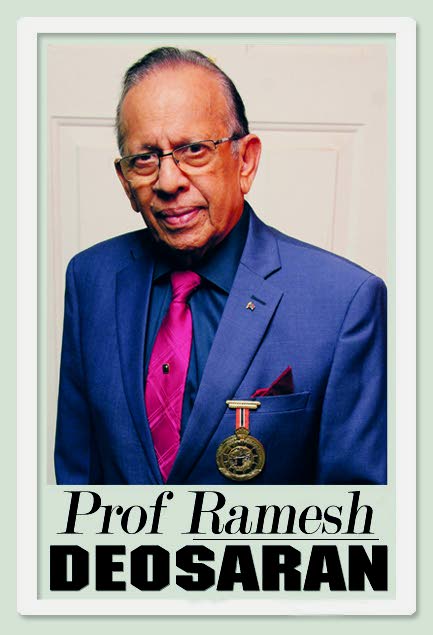PM, Farley tackle Tobago crime

The Prime Minister’s quick presence in Tobago last week, accompanied by his top-level crime-fighting officials, was in response to a quadruple murder and the island’s escalating murder rate – 16 so far.
His lavishly-published mission was obviously designed to bring temporary hope to the Tobago House of Assembly (THA) and its worried population. Both islands (304 murders so far) are in an era of mass murders.
For Trinidad, anyone watching Police Commissioner Erla Harewood-Christopher’s explanations before a joint select committee last week will recognise how much more public safety work needs to be done, given the failures of repeated promises.
The front-page headline: “Erla fails again on crime.” It looks as if she was thrown into waters too deep. For example, from a targeted ten per cent decrease in murders, only “a dismal” one per cent was achieved – ten to one is murder. She needs help with this complex challenge. While “news” must be new, it sometimes looks as if editors forget the archives filled with past promises and the bulk of shelved anti-crime proposals.
Last March, five men, including a sergeant, were gunned down (three on the spot, two in hospital) at an East Port of Spain Harpe Place HDC apartment complex. Gang war, police said. Photos, official visits, promises.
Last May, four were gunned down and eight were injured at a Cocorite HDC housing complex. Photos, promises and plans again. Gang war, police said. A 29-year-old suspect was held at the airport.
Not even Fitzgerald Hinds’ $100,000 reward offer brought results. Trinidad has very big gang and murder problems.
Anyhow, noting that “90 per cent of the officers who are policing Tobago are Tobagonians,” the troubled PM promised to send a battery of police officers from Trinidad to Tobago “to benefit from a greater intermingling of the services.”
Of course, we have had Trinidad police officers in Tobago before, some in leadership.
Striking a controversial community policing reference, he said Tobago policing “is not as sharp as it should be because of the general maxim that “familiarity breeds contempt” – implying “familiarity breeds corruption” too. The dilemma is that community policing requires familiarity with citizens.
Additionally, the PM promised to have a dedicated E-999 system for Tobago. Quite good.
Not to be left out, the articulate Hinds promised to add more CCTV cameras to the 181 already in Tobago.
And THA Chief Secretary Farley Augustine said he “was satisfied with the plans,” but called for “an aggressive approach” by the police.
Meanwhile, UNC MPs Saddam Hosein and Dr Roodal Moonilal have expressed dissatisfaction with Dr Rowley’s plans. Well, there goes a piece of the PNM-UNC “polygraph-testing goodwill.”
In terms of execution, however, Rowley’s “familiarity breeds contempt” in Tobago and Augustine’s “aggressive approach” needs operational definitions. After all, when Tobago’s murder rate recently went to 12, Augustine promised a community-based crime prevention strategy with THA resources. So really, what Tobago seems to need now is a strategic, sustainable integration of community policing with effective traditional law enforcement.
To help bolster this, Minister of Youth and National Service Foster Cummings, should meet urgently with the THA, share resources, and work out an integrated training-to-employment programme. Given the relationship between gangs and unemployment, the THA should partner with hotel entrepreneur John Aboud and see to what extent his new Tobago hotel could employ the many idle youths there. In fact, this should now be a mission for other businesses.
Now, ACP Collis Hazel is a “Tobago son of the soil” with a very good policing record – also well-versed in community policing. When I was at UWI developing Tobago’s community policing programme, he was found to be an excellent community-policing achiever – skilfully using sociology and psychology. We gave him and others special awards for their efforts.
I make the point about ACP Hazel to suggest that there are Tobago officers who can take up the challenge under effective leadership, such that the deployed officers from Trinidad must move gently, not necessarily “aggressively,” into the terrain.
But this ongoing “politics of crime” drama does not end here. There is the elephant in the room – the two Tobago parliamentary seats.
If Tobagonian Dr Rowley’s crime plans work, for example, it will bring credit to his election campaign for the two vital seats. However, with Augustine’s celebrated 14-1 victory over the PNM in the last THA elections, his Tobago People’s Party (TPP) no doubt is building political capital to conquer the two Tobago seats to help strengthen the THA’s bargaining power after the general election.
It is therefore interesting to see, if or when Dr Rowley’s crime plans work, how the political credit will be shared with the THA.
What about if they don’t work? Under this dual system of Tobago’s governance, how far will Augustine’s political shrewdness succeed against a revived PNM election machinery under Dr Rowley and the versatile Minority Leader Kelvon Morris, and when crime is expected to be among the number one-campaign issues?

Comments
"PM, Farley tackle Tobago crime"